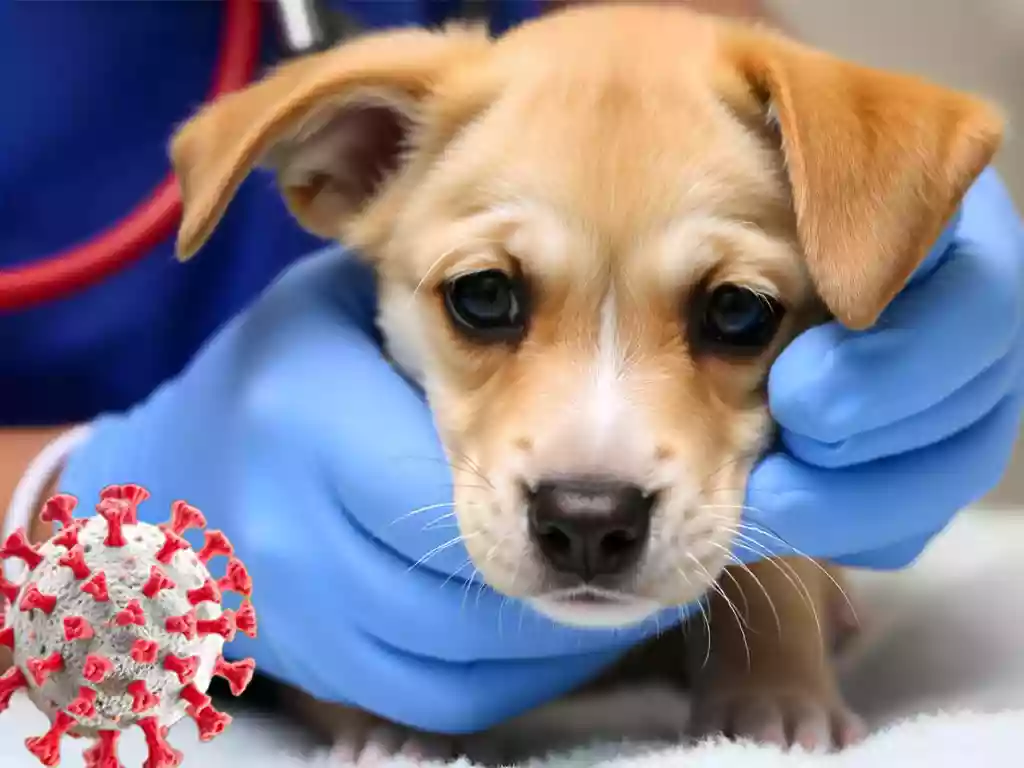Canine parvo in puppies is a mostly contagious viral infection that predominantly impacts puppies but can affect dogs of any age. It specifically quickly contributes to a group, which is abundant adult puppies, making them especially vulnerable.
Intestinal Damage:
Parvovirus quickly distributes cells of the necessary border. This destruction impairs nutrient absorption and causes severe diarrhea. The loss of the necessary lining also makes the puppy more open to secondary infections.
Bone Marrow Suppression:
The virus affects the bone marrow, leading to a reduction in white blood cells (leukopenia). This suppression of the immune system makes puppies more prone to infections and complications.
Cardiac Impact:
In puppies that are particularly under 8 weeks of age, parvovirus has the potential to induce myocarditis, which is the inflammation of the heart muscle. This condition may lead to either sudden death or long-term cardiac issues.
Symptoms And Signs Of Parvo In Puppies
The clinical manifestations of parvovirus in puppies can be quite severe and may emerge within 3 to 7 days following exposure. The symptoms include:
Severe Diarrhoea
Severe diarrhea in puppies is a critical condition that can rapidly lead to dehydration and other serious complications. Often characterized by frequent, watery stools that may contain blood or mucus, severe diarrhea in puppies can be caused by various factors including viral infections like parvovirus, bacterial infections, dietary indiscretion, or parasites. The rapid loss of fluids and electrolytes not only exacerbates dehydration but also impairs the puppy’s ability to absorb essential nutrients, leading to weakness and lethargy. Prompt veterinary intervention is crucial to address the underlying cause, manage dehydration through intravenous fluids, and implement appropriate treatments to stabilize the puppy’s condition and prevent further health issues.
Vomiting
Vomiting in puppies is a symptom that can signal a range of underlying issues, from mild gastrointestinal upset to severe systemic state. When a puppy vomits, it can be due to causes such as viral or bacterial infections, dietary indiscretions, parasites, or more serious states like pancreatitis or digestive system obstructions. Vomiting can lead to aridity and an imbalance in electrolytes, making it censorious to demand the puppy closely and ensure they stay hydrated. Persistent or severe vomiting vital prompt vet attention to determine the cause and initiate an apt, cure, which may include drugs to control nausea, fluids to address dehydration, and diagnostic tests to identify any serious underlying health problems. Early intervention is key to preventing complications and ensuring the puppy’s swift recovery.
Loss Of Appetite
A decrease in appetite among puppies is a concerning indicator that may signal a range of health problems, from minor gastrointestinal disturbances to more severe systemic disorders. If a puppy suddenly declines food or exhibits minimal interest in eating, it could be suffering from pain, nausea, or an underlying condition such as a viral or bacterial infection, parasitic infestation, or dental issues. Extended periods of reduced appetite can result in weight loss, weakness, and hindered development, underscoring the importance of addressing the situation without delay. Timely consultation with a veterinarian is vital to identify the underlying cause of the appetite reduction and to initiate suitable treatment to restore the puppy’s health and support its proper growth and development.
Fever in puppies:
In puppies, fever is characterized by an elevated body temperature, which often points to an underlying infection or inflammation. The typical temperature range for puppies is about 101 to 102.5 degrees Fahrenheit (38.3 to 39.2 degrees Celsius). A fever is generally recognized as a temperature that exceeds 103 degrees Fahrenheit (39.4 degrees Celsius). This condition can be caused by a range of factors, including viral or bacterial infections, inflammatory diseases, or other systemic problems. Symptoms that may accompany a fever include lethargy, loss of appetite, and shivering. It is imperative to monitor a feverish puppy carefully and to seek veterinary care promptly to ascertain the cause and commence appropriate treatment, as a high or persistent fever can lead to more serious health complications.
Lethargy In Puppies
Lethargy in puppies is a concerning indicator of possible illness or discomfort, marked by an unusual level of fatigue and diminished energy. When a typically lively and playful puppy appears excessively quiet or weak, it may suggest the presence of underlying health concerns, including infections, nutritional deficiencies, or more severe conditions such as parvovirus or other systemic ailments. It is crucial to seek prompt veterinary assessment to identify the root cause of the lethargy, tackle any underlying issues, and guarantee that the puppy receives the necessary treatment to regain its vitality and overall health.
Dehydration In Puppies
The occurrence of severe diarrhea in puppies is a serious condition that can quickly lead to dehydration and other critical health issues. This ailment is typically characterized by frequent, watery stools that may contain blood or mucus. A range of factors can instigate severe diarrhea in puppies, including viral infections such as parvovirus, bacterial infections, inappropriate dietary choices, or parasitic infections. The swift loss of fluids and electrolytes not only intensifies dehydration but also disrupts the puppy’s ability to absorb necessary nutrients, resulting in weakness and lethargy. Timely veterinary intervention is vital to diagnose the root cause, manage dehydration with intravenous fluids, and implement effective treatments to stabilize the puppy’s condition and prevent additional health problems.
Diagnosis:
In puppies, parvovirus often presents with severe, bloody diarrhea and frequent vomiting. Affected puppies typically show a marked loss of appetite, lethargy, and signs of dehydration, such as dry gums and sunken eyes. They may also have a fever or, in severe cases, a drop in body temperature, along with abdominal pain. These symptoms can rapidly escalate, making prompt veterinary care crucial.
Faecal Tests
The detection of parvovirus in puppies through fecal tests commonly utilizes enzyme-linked immunosorbent assay (ELISA) to ascertain the presence of viral antigens in the stool. These tests are characterized by their high specificity and can swiftly confirm a parvovirus infection, frequently within just a few minutes. A positive outcome indicates the virus’s presence, aiding veterinarians in diagnosing the infection and initiating the necessary treatment.
Blood Tests
Blood tests in puppies with parvovirus infection often reveal a low white blood cell count (leukopenia), indicating a compromised immune system. These tests can also show elevated levels of proteins or electrolytes due to dehydration and possible electrolyte imbalances. Additionally, changes in other blood parameters can help assess the severity of the infection and guide treatment decisions.
How To Treat Parvo In Puppies
The following steps usually involve in treatment process
Fluid Therapy
In the case of puppies suffering from parvovirus, fluid therapy is essential for managing the dehydration that arises from severe episodes of vomiting and diarrhea. By providing intravenous fluids, veterinarians can effectively restore the balance of electrolytes, improve hydration status, and support the overall physiological functions of the body. This treatment is crucial for stabilizing the puppy’s condition and is particularly important for recovery in severe cases, where dehydration can rapidly escalate to a life-threatening situation.
Antibiotics
In the case of puppies suffering from parvovirus, fluid therapy is essential for managing the dehydration that arises from severe episodes of vomiting and diarrhea. By providing intravenous fluids, veterinarians can effectively restore the balance of electrolytes, improve hydration status, and support the overall physiological functions of the body. This treatment is crucial for stabilizing the puppy’s condition and is particularly important for recovery in severe cases, where dehydration can rapidly escalate to a life-threatening situation.
Nutritional Support
Nutritional support is essential for puppies with parvovirus, as they may be unable to eat or digest food properly due to severe gastrointestinal symptoms. This support often involves providing easily digestible, high-quality diets or offering intravenous or subcutaneous nutrition if the puppy is unable to eat. Ensuring the puppy receives adequate nutrition helps maintain energy levels, supports the healing process, and prevents further complications related to malnutrition. Adjustments to the feeding plan are made based on the puppy’s condition and response to treatment.
How To Prevent Parvo In Puppies
You must follow following steps to prevent from Parvo in puppies:
Vaccination
Preventing parvovirus in puppies through vaccination is essential to ensure their health and safety. Here’s how vaccination can protect puppies from parvo:
Start Early
Puppies should begin their vaccination series at six to eight weeks of age. Early vaccination is crucial because puppies are highly susceptible to parvovirus. Once the maternal antibodies they receive from their mother begin to wane.
Follow the Vaccination Schedule
After the initial shot, puppies typically require booster shots every three to four weeks until they are about 16 weeks old. This schedule ensures that the puppy develops full immunity as the effectiveness of maternal antibodies diminishes.
Get a Booster Vaccination
At one year of age, a booster shot is usually administered to reinforce the dog’s immunity against parvovirus. After this, most veterinarians recommend a booster every three years. Some may suggest annual vaccinations depending on the risk level.
Hygiene
Preserving a clean and contamination-free environment is vital. Frequent disinfection of locations where dogs gather can help in curbing the transmission of the virus.
Avoiding Exposure
It is advisable to minimize interactions with dogs that may be altered. And to steer clear of high-risk locations, such as dog parks until the puppy has received its complete inject list.
Prognosis
The diagnosis of a puppy analyzed with parvovirus is contingent upon multiple factors. Including the age of the puppy, its overall health condition, and the speed at which treatment is commenced. With timely and effective intervention, certain puppies may experience recovery; nevertheless, the illness can prove fatal, particularly in very young or severely impacted puppies.
More Articles Like This:
How long can Parvo live on human skin?
Parvo In Cats, Parvo Symptoms In Cats, And How To Cure
What Is Parvo In Dogs, Symptoms Of Parvo In Dogs, How Prevent



